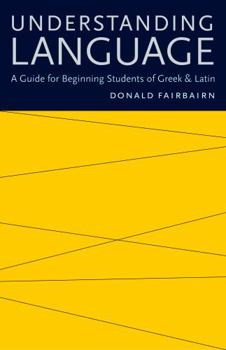Understanding Language: A Guide for Beginning Students of Greek & Latin
Select Format
Select Condition 
Book Overview
Why do students today find Greek and Latin so difficult and frustrating to learn? Perhaps the primary barrier preventing us from learning another language successfully is that we often subconsciously believe that English is the standard for the way languages must express ideas, and therefore we unwittingly try to fit the new language into the structure of English. This book seeks to break students out of "English mode" as soon as possible, at the very beginning of study. Rather than constantly relating Greek and Latin to English, the book starts with a big-picture discussion of what any language must do in order to facilitate communication. It then explains how Indo-European languages in general accomplish the tasks of communication, and how Greek and Latin in particular do so. Understanding Language includes major sections on the noun and verb systems of the classical languages. In both cases, the book deals first with function (what nouns and verbs must do) and then explains how the forms of Greek and Latin achieve the needed functions. As a result, the book helps to make the hard tasks of memorizing forms and learning syntax easier and more enjoyable. Students gain a broad understanding of the way the classical languages work before they begin the details. This book gives students some of the conceptual benefits of studying two closely related languages, even if they are studying only one of them. Students do not need to be studying both Latin and Greek (or even to know the Greek alphabet) in order to profit from this book. Teachers may choose to have students read the entire book at the beginning of their study or to read sections at various points in the first year.
Format:Paperback
Language:English
ISBN:0813218667
ISBN13:9780813218663
Release Date:August 2011
Publisher:Catholic University of America Press
Length:190 Pages
Weight:0.66 lbs.
Dimensions:0.6" x 5.4" x 8.4"
Customer Reviews
1 rating
"Understanding Language: A Guide for Beginning Students of Greek & Latin" is an excellent resource o
Published by Alistair McPherson , 5 years ago
Students of Greek (koine) and Latin will love this book! Written simply, Donald Fairbairn has produced a most helpful text for students to learn--and retain--an approach to the building blocks of language. As Fairbairn concludes, "Studying Greek or Latin is worth the struggle, because the rewards of that study are so great" (Part 4: "Looking at Sentences as a Whole," p. 182). Anyone embarking on the formal study of Greek (koine) or Latin will find this book a helpful approach to understanding grammar as "an open door to the wonders of communication in general, wonders to which Latin and Greek are so well suited to introduce us" (p. 183). I recommend this book to high school students, undergraduate, seminary, and even Ph.D.-level students wanting to brush-up his or her approach to learning Greek and Latin.





